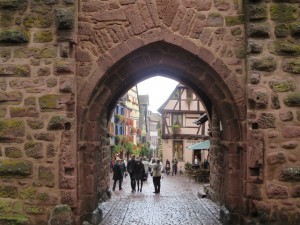Rolf Potts's Blog, page 53
October 28, 2013
Another adventure, another reason on why travel is my passion
Vagablogging :: Rolf Potts Vagabonding Blog
Having just come back from another great trip, I’m reminded again of the richness of Europe and the gifts it keeps on giving to any traveler willing to seek them out. I went to France on assignment for three mid-size, nationally-distributed magazines, and set to work almost immediately. It’s amazing how profoundly engrossing traveling and learning can be, especially when you have the added incentive of a contract for a story that must be delivered. Poking around the countryside and investigating ancient abbeys, ruined castles, and little medieval towns gives me a charge like nothing else. It satisfies my twin desires of adventure and knowledge.
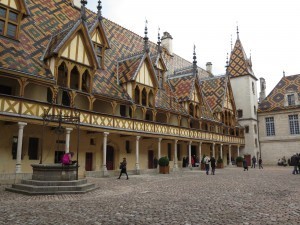
Medieval charity hospital in Beaune, France
As usual, the interactions with locals carbonated the experience. Sharing a bench—and soon after, a lively conversation—with a local man in half-timbered Rouen or chatting with the lady at the café table next to mine in the pretty little Burgundian city of Beaune added texture to the photos I’d taken. The clusters of pixels in my camera contained beautiful images of churches and historic buildings, but the connections forged with the everyday residents of these places gave depth and perspective to the memories in my own mind—a depth and perspective I hope will be felt by my readers.
It’s the local people—like the kindly town archivist in the German city who helped me make sense of his community’s tragic WWII history—that are the real repositories of history and tradition. Without him, I’d never had known about the moving memorial that sits on a seldom-visited hill just outside the town. It was a powerful, emotional experience to visit the lonely hill—the last resting place of so many of his community who lost their lives while the dueling armies fought it out around them—alone at sunset.
At those times you realize that the pretty stuff is only architecture.
Other travelers met on the road have become new friends too; I’ll soon be swapping trip highlights over email with the LA filmmaker from the Rhine River Valley village of Bacharach, the Seattle-area photographer from St. Goar, and the US psychology student from Colmar.
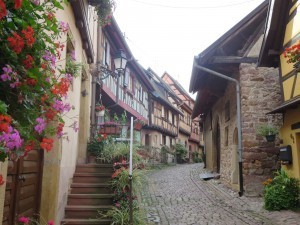
Village in rural Alsace, France.
As I sit here shaking off jetlag and organizing my hastily-scribbled notes, I smile as I think about the experiences I crammed into my short trip. The research I did and the photos I took will yield excellent material for my article assignments. But more importantly, the experiences are already sowing the seeds of ambition for my next adventure overseas.
Original article can be found here: Another adventure, another reason on why travel is my passion
October 27, 2013
Alden Jones on the ethical conundrum of travel writing
Vagablogging :: Rolf Potts Vagabonding Blog
“Good writers — travel writers or otherwise — make real and tangible a world that some readers have never inhabited. Just look at the great draw of the bizzaro worlds of “Harry Potter” or “The Hunger Games.” What turns travel writing into an ethical question that sets it apart from sci-fi or literary fiction is that travel writers take real cultures and erect them for readers who trust them to be loyal and accurate. But the truth is, most travel writers are only passing through.”
–Alden Jones, “Is ‘Exoticism’ A Dirty Word?” WBUR Cognoscenti, August 30, 2013
Original article can be found here: Alden Jones on the ethical conundrum of travel writing
October 24, 2013
Marrying a Culture
Vagablogging :: Rolf Potts Vagabonding Blog
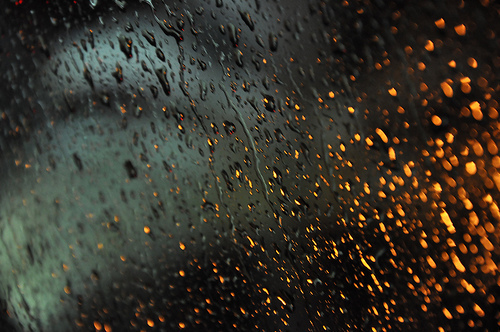
Pic credit:Flickr/Chloester
“Marrying into a culture is a strange pinnacle of interaction. All of these travelers and travel writers think they’re so “extreme” because they visited this place or that place or ate this or bungee jumped off that, but — in my experience — there is nothing more challenging than truly learning language and culture to the point that you can have a genuine relationship with your mother- and father-in-law. That is some crazy shit . . . trust me.” Thomas Kohnstamm, interview
Oh yes. There is so much wisdom in this quote I can almost feel it coming out of the screen and slap me across the face, Chuck Norris’ style.
In brief: I’m sitting at the table I sit at every day for hours on end, writing, researching and imagining the new worlds that hang before me, stylized into the colors of a world map. My fiancee has left for her training session on the benefits of Chinese tourism to the local hotel industry. I think I’ll have another cup of coffee as soon as I finish this post. I have a bunch of bills to settle, and I know I’ll have to explain myself in a foreign language that sounds increasingly less foreign to my ears. I don’t see any Himalayan peak nor any series of earthen huts with thatched roofs from my window. There is just a solitary row of damp saris and t-shirts flapping in the wind.
Today, there won’t be any exciting hike, nor any backpacker competition to ascertain who stayed on the road for longer and with lesser cash. However, I might end up running at the park, skirting the hungry monkeys in search of food to avoid getting a rabies-infected bite and spend the night at the hospital. Or, I could visit my friend at the Buddhist sanctuary, sit under an outgrown branch”stolen” from the original Bodhi Tree, and sip cardamom tea. I’ll leave the visit to my in-laws for later, during the weekend. Today, I don’t feel like making the drive.
I glance out of the metal bars affixed before my apartment’s door frame, and I see nothing that could resemble “traveling”. At the same time, I feel like I’m as far as possible from any traveling stereotype. Strange, isn’t it?
Original article can be found here: Marrying a Culture
October 22, 2013
Book recommendation: Conflict: Journeys in war and terror in Southeast Asia by Nelson Rand
Vagablogging :: Rolf Potts Vagabonding Blog
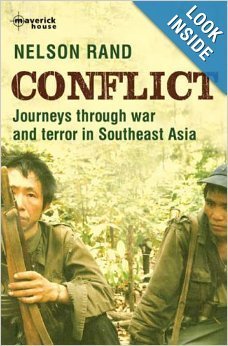 I’m an avid reader. I’ve long made it a practice to choose books that followed my journeys. It’s a wonderful way to add depth and richness to my own experiences and observations, and to see the world through more eyes, more lives, than just my own.
I’m an avid reader. I’ve long made it a practice to choose books that followed my journeys. It’s a wonderful way to add depth and richness to my own experiences and observations, and to see the world through more eyes, more lives, than just my own.
Last summer I found myself on parade of bumpy bus rides across Vietnam and down the less traveled end of the Mekong River in Laos. With my legs folded on top of crates of fruit as the bus lumbered through the monsoon rutted mud roadways I paged my way, one country at a time, through Nelson Rand’s Conflict: Journeys through war and terror in Southeast Asia. This part of the continent has been, and in some places continues to be, a war ravaged corner of the world. It’s hard for me to imagine, shopping in the riverside markets and climbing through the gorgeous ruins of antiquity, planes flying over head, carpet bombing, families hiding out in the jungle, genocide, death, destruction. And yet, within my lifetime these have been realities in this part of the world. Instead of focusing on the big pictures and the official histories, Rand tells stories, first hand, of the people he’s met and the lives they’ve lived through war and terror, as the title suggests.
There is no shortage of interesting books to pick up on your travels through Southeast Asia, but if you’re looking for a well worn recommendation for a window into the heart of individual experiences across Vietnam, Cambodia, Laos and Burma, I heartily recommend this one.
Original article can be found here: Book recommendation: Conflict: Journeys in war and terror in Southeast Asia by Nelson Rand
October 20, 2013
Pauline Kael on the joys of watching foreign films
Vagablogging :: Rolf Potts Vagabonding Blog
“Movies are used by cultures where they are foreign films in a much more primitive way than in their own; they may be enjoyed as travelogues or as initiations into how others live or in ways we might not even guess. The sophisticated and knowledge able moviegoer is likely to forget how new and how amazing the different worlds up there once seemed to him, and to forget how much a child reacts to, how many elements he is taking in, often for the first time. And even adults who have seen many movies may think a movie is “great” if it introduces them to unfamiliar subject matter; thus many moviegoers react as naïvely as children to “Portrait of Jason” or “The Queen.” They think they’re wonderful. The oldest plots and corniest comedy bits can be full of wonder for a child, just as the freeway traffic in a grade Z melodrama can be magical to a villager who has never seen a car. A child may enjoy even a movie like “Jules and Jim” for its sense of fun, without comprehending it as his parents do, just as we may enjoy an Italian movie as a sex comedy although in Italy it is considered social criticism or political satire.”
–Pauline Kael, “Trash, Art, and the Movies,” Harper’s, February 1969
Original article can be found here: Pauline Kael on the joys of watching foreign films
Vagabonding Field Report: What to do when your road trip throws you road blocks in the Four Corners, USA
Vagablogging :: Rolf Potts Vagabonding Blog
Cost/day: $100
What’s the strangest thing you’ve seen lately?
Fulford Cave sits in a national forest near Eagle, Colorado. It’s huge! The entrance is an awkwardly-angled pipe, but once you’re past the uncomfortable wiggle down the aluminum ladder, the cave opens up into several enormous rooms, passages and even a waterfall. I climbed and explored for around three hours, and didn’t even reach the halfway mark. Places like this are astonishing for how well hidden they seem. Walking around the forest, you’d never suspect there’s such a cave right under your feet.
Describe a typical day:
I wake up when the sunlight has become too bright to ignore through the walls of the tent. My boyfriend and I do an hour of yoga, eat a bacon-and-egg breakfast, wash dishes, pack up the tent, and are on the road by the crack of noon (getting up early is not our forte).
We drive three to four hours per day, stopping along the way to photograph brilliant gold aspen trees covering the mountains. We listen to podcasts and audio books, restock the cooler, and curse our GPS for freezing up and leading us the wrong way. We hunt down camping spots as far away from paid campgrounds and people as possible–back country solitude is the name of the game. Nights are for camp fires, hot tea and music through our portable stereo.
Describe an interesting conversation you had with a local:
On our second day of the trip, we noticed we were eating breakfast inexplicably alone in Utah’s Canyonlands National Park. As we approached the park exit, our trip literally came to a screeching halt as we found a ranger’s truck blocking our path.
This is when the ranger told us the government had shut down. All the national parks we planned to visit over the next two weeks, including the Grand Canyon, Arches and Zion National Parks, would be closed. The ranger seemed incredulous that we were just learning about the shutdown, but I’m sure my shock factor was way higher. We had to completely redesign our itinerary after that conversation.
What do you like about where you are? Dislike?
On one hand, spending more hours brainstorming places to go and looking up maps and directions mid-road trip was a pain. But on the other hand, having the main attractions closed prompted us to find the lesser-known wonders of the southwest that we otherwise would have overlooked. The region holds so much undiscovered beauty: slot canyons, natural hot springs, red rocks, and even a castle. What would we have missed by staying on the traditional tourist path?
Describe a challenge you faced:
My boyfriend heard of a natural hot spring forty miles south of our camp in Sedona, Arizona. After driving twenty miles on a rough dirt road, I cringed as we cleared the last rocky bump into a campground. Because sunset was fast approaching and we wanted to find the springs before dark, we got out of the car and speed-hiked another mile up the nearby stream. We reached the springs with barely a twinge of daylight left in the sky; the only problem was that the springs were across the river, and there was no bridge in sight.
We tried gripping hands and taking cautious steps across the river, but three steps in, we fell and got soaked by the strong current. Intuition told me this was not the safest idea, especially with impending nightfall and my swimming skills not up to life guard quality.
Luckily, the people already soaking in the springs shouted across the river to us and directed us to a shallow crossing upstream. We waded safely to the other side, where we were rewarded with steaming pools and a sky bursting with stars.
What new lesson did you learn?
I learned to appreciate the incredible, vast landscape where I come from (Denver area, Colorado). After traveling in Asia for a year, I’ve come to recognize that the southwestern US is a special place to be treasured and protected. Not everywhere in the world has this kind of openness. I’m grateful for wide views of the sky, clean air, and access to back country hiking and backpacking.
Where next?
Somewhat bittersweetly, my travels have come to an end for now. I’ll be living and looking for work in Denver–but who knows when the travel bug might bite me next.
Original article can be found here: Vagabonding Field Report: What to do when your road trip throws you road blocks in the Four Corners, USA
October 16, 2013
Vagabonding Field Report: Thailand
Vagablogging :: Rolf Potts Vagabonding Blog

Cost/day: $25

What’s the strangest thing you’ve seen lately?
The fire shows that happen every night on Koh Phi Phi Don were crazy. And the partying. People are jumping ropes that are on fire, juggling fire, and swallowing fire.


Describe a typical day:
We spent two weeks traveling around Bangkok, Chiang Mai, and the Phi Phi Islands. Some days we rented a motor bike and rode out to the mountains, others we hiked around and swam in the ocean, and others we took trains and tuk tuks out to some temples. We went on a couple of long boat excursions, went snorkeling, and some days went shopping. We ate Pad Thai and Morning Glory (water spinach) for almost every meal. At night we would drink a Chang on the beach and look at the stars.


Describe an interesting conversation you had with a local:
Everyone was pretty friendly and helpful when I was there. One person gave me a ride in to town on the back of his motorcycle when I was lost and had no other way to get there and insisted that I didn’t owe him any money after the ride. It wasn’t so much a conversation as it was a local just being a nice person to a tourist for nothing in exchange.

What do you like about where you are? Dislike?
I think that Thailand is beautiful and the people are really friendly. I love the food. Things are cheap and there is plenty of fun activities to keep you busy. If you’re able to get away from the crowds you can see some of the most amazing beaches and there are tons of stars in the sky at night. You can get a massage for an hour for about $10. My dislike would be how crowded and polluted it can be in the tourist areas.

Describe a challenge you faced:
For me it was kind of terrifying riding on the back of a motorbike in the city of Chiang Mai. My boyfriend drove, and I constantly felt like we may get ran off the road or hit by one of the many forms of transportation speeding down the highways. Also, one night in Koh Phi Phi Don we realized that there was a family of mice sleeping in our mattress, and it was too late to find another place to stay. That was a bit of a challenge.


What new lesson did you learn?
I learned that I need to go back to South East Asia and spend a long time traveling around, two weeks is not nearly enough.

Where next?
Next month I am (hopefully) going to Brazil for a photography job! More here.

Original article can be found here: Vagabonding Field Report: Thailand
October 15, 2013
Monumental journeys as milestones
Vagablogging :: Rolf Potts Vagabonding Blog
Our family has a long history of making memories instead of collecting things. We love to give gifts, don’t get me wrong, but most of them are little homemade things, or gifts of self in some capacity. Perhaps most precious are the gifts of time and of memories.
We didn’t get a honeymoon. I had back surgery instead. Long story.
So, we started taking annual honeymoons:
Year One: a road trip to Florida and a three day cruise to the Bahamas.
Year Five: a motorcycle trip through the maritime provinces of Canada.
Year Ten: Hawaii
Year Fifteen: A rainy tent in England, one month into a year long cycle trip around Europe.
Year Twenty: This coming spring (where did the time go?) We’re thinking Paris, just to be cliche.
One year we gave our kids camel rides on the Sahara for Christmas. Ezra got an elephant ride in Thailand for his tenth birthday. Hannah got a visit to Angkor Wat for her sixteenth; we went skiing in New Zealand for her seventeenth.
This coming year I turn 40. To honor that milestone I’m taking a walk with an old friend. We share a birth year, and it’s been her dream to walk the Camino de Santiago in Spain. Something about forty, the nice round hilltop of mid-life, that makes a good place to stop and take a breath, lift our heads and take a look around: at the past, and the path before us into the future. It will be a monumental journey. No husbands. No kids. Just her and me, our boots and our backpacks.
Many tangible gifts have passed through my hands over the years, many of them treasures for a while. The ones that have passed through my heart are the ones I still hold dearest, the ones that I can unpack in the quiet of a dark moment and that bring light to my life in the way no purchased item ever has. Perhaps it makes me an oddity, but I’d always rather make a memory than spend equal money on a “thing.”
How do you mark milestones? Have you used journeys to celebrate and measure out life? Tell me about that.
Original article can be found here: Monumental journeys as milestones
October 13, 2013
The subjective nature of travel writing has always been part of its appeal
Vagablogging :: Rolf Potts Vagabonding Blog
“For the personal, subjective nature of [travel] literature has always been one of its chief and most endearing elements, no matter how often some readers and critics through the ages have tried to eliminate it from all travel accounts as undesirable, or have failed to find it except in those published after the supposed rise of something called “romanticism.” Even in the eighteenth-century critical conflict over the personal and objective in travel literature, as well as the definition, often published, that attempted to limit, even eliminate, the subjective, simply proves the point that, if the personal element had not already been so popular and so much desired, the purists – found in any age – would not have been so insistent on muting it and stressing the factual content of the account. The most widely read of Renaissance travelers were the subjective ones, and in the eighteenth century Johnson was obviously voting with the majority when he found Boswell’s first-person narrative of his own experiences more attractive than the historical-geographical section he added to his book on Corsica.”
–Percy G. Adams, Travel Literature and the Evolution of the Novel (1983)
(1983)
Original article can be found here: The subjective nature of travel writing has always been part of its appeal
October 10, 2013
Book Review: Ghost Money by Andrew Nette
Vagablogging :: Rolf Potts Vagabonding Blog
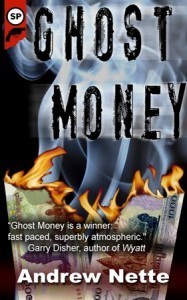 GHOST MONEY by Andrew Nette
GHOST MONEY by Andrew Nette
Published by Snubnose Press, 2012. Available in eBook format and paperback.
I believe that to be better travellers, we must know about the history of the places we visit. Ghost Money, a crime novel by Australian writer Andrew Nette, helps do the trick for Cambodia, the popular culture way. Pulp, to be precise. It paints a vivid, fluid description of the country in the mid 1990s, when Cambodia started to recover from the deadly domination of the Khmer Rouge. Ghost Money takes the reader by hand and help him wade through the darkness of Southeast Asia most unfortunate country’s recent past.
The prose slowly unearths important historical details, and it feels like a candle that’s been raised up high to keep the obscurity at bay. As we are pulled into the darkness by the firm grip of a narration that never seems to let go of our neck, we get to discover so much more about a Cambodia that’s gone past.
If protagonist Max Quinlan were a Chinese, he’d be called a “banana”: yellow outside, but white inside. A product of a Vietnamese-Australian lost relationship, Max is an ex-cop turned sour the way green apples do. His soul is definitely less white trash than a bogan’s, but is inevitably trapped inside an Australasian cocoon disguised for yellow skin. Such an interesting take on an otherwise quite clichéd sour ex-cop stereotype elevates Quinlan from the moshpit of decadent white detectives who lost their minds trying to negotiate the underbelly of Asia’s most terrifying literary cities. Regardless, also Max’s private life has started to smell like sulphur after things got out of control during an international post in Bangkok. Now, the man’s got to scrap off a living by locating missing people. And that’s exactly how he ends up on the mystery trail of Charles Avery, an Australian expat who’s disappeared without a trace, last stop Phnom Penh, Cambodia. At least, that’s where the evidence Quinlan finds in a Bangkok third-rate hotel room suggests – completed by the stench of a dead body with a cracked skull, nonetheless -. Hence, potentially to try to curb a haunting mistake of the past, our mixed-blood private eye trusts his gut feelings, and doesn’t think twice before getting on the next plane to Phnom Penh.
Ghost Money is like that: it starts with a frontal bang, then puts the car in reverse, slowly returns in the initial position, and pushes the pedal to the metal until it crashes against the wall once again. And again. Until Max Quinlan will piece together the parts of a lunatic puzzle using a golden thread of secrets and lies… and I am not going to spoil anymore of the plot.
If you like a good crime story that’s able to evoke the palm fringed, foul smelling Cambodian avenues and line them up with shady characters as if you’d just finished playing with an Ouija board, well, you’ve found a winner here. And a bunch of spirits willing to tell you some inconvenient Cambodian truths under their breath.
It all works so recklessly well that I am forced to recommend Ghost Money to all of those travellers, armchair and otherwise, who are thinking about visiting Cambodia for the first time. This book can help take a first bite of the country’s sweet-sour taste, masking it under an intricately woven shroud of fiction. A bite from an apple injected with black blood, a proper aftertaste of genocide. Completed by the acrid smell of cigarettes burnt on the tip of a dry tongue. A sizzingly exciting Asia noir read not to miss.
Original article can be found here: Book Review: Ghost Money by Andrew Nette
Rolf Potts's Blog
- Rolf Potts's profile
- 323 followers


